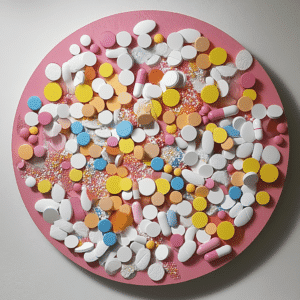
Overcoming Obstacles in Recovery and Finding Hope Together
Recovery from addiction can feel like climbing a mountain—every step is both a challenge and a triumph. As parents, you might be supporting your children on this rocky road filled with hurdles, but remember, overcoming obstacles in recovery is a journey we can embark on together. We understand that emotional, social, and practical barriers can hinder progress, but by identifying these challenges and embracing solutions, we can help foster an environment of healing and hope.
In this article, we’ll delve into eight key obstacles that often arise during recovery. We’ll also discuss actionable strategies to overcome these challenges, ultimately shining a light on how we can find hope together.

1. Understanding the Emotional Rollercoaster
Addiction recovery isn’t just about physical health; it’s a deeply emotional journey. Many clients experience a whirlwind of feelings—anxiety, depression, and even post-traumatic stress. A study published in the Journal of Substance Abuse Treatment highlighted that 56% of individuals in recovery reported struggling with intense mood swings.
To cope with this emotional turbulence, parents and caregivers can introduce mindfulness practices. Programs like “Mindful Recovery” teach valuable skills to help manage these emotions. Remember, acknowledging feelings is the first step toward healing. Embracing the emotional aspect can give you and your child the tools to better navigate this rocky terrain.
2. Navigating Social Stigmatization
Stigmas associated with addiction create hurdles, not only on a personal level but socially too. The myths and misconceptions surrounding addiction often lead to isolation. People in recovery sometimes feel judged by their communities. However, stories of resilience, such as that of rapper Eminem—who candidly shared his struggles with addiction—demonstrate how reclaiming one’s narrative fosters acceptance and understanding.
Start a conversation about addiction within your community. Talking openly about these stigmas can break down barriers. Communities that openly discuss and understand addiction are often more supportive and welcoming to those in recovery.
3. Dealing with Relapse Triggers
Relapse triggers can pop up unexpectedly, whether they’re friends, places, or emotions tied to past struggles. The National Institute on Drug Abuse has developed a “Trigger Management Toolkit” aimed at helping individuals identify and cope with potential temptations.
Consider using technology to stay connected. Apps like “Sober Grid” allow users to track their triggers and connect with others on similar journeys. By creating a supportive network, the chance of overcoming these obstacles significantly increases.
4. Financial Constraints
The cost of recovery programs can often feel unbearable. According to the Substance Abuse and Mental Health Services Administration (SAMHSA), financial instability is one of the biggest barriers to effective treatment. But don’t lose hope! There are options available to alleviate some of this financial pressure.
Organizations like Mothers Against Addiction offer resources and alternative funding options for parents facing financial hardship. Community fundraisers and local programs can also help bridge the gap. It’s crucial to remember that financial setbacks don’t mean recovery is out of reach.
5. Finding the Right Support System
A solid support system can make all the difference in recovery. Yet many find themselves surrounded by individuals still grappling with addiction, which can hinder progress. Organizations like Al-Anon offer vital networks of support for families dealing with addiction, providing a place to connect with others who understand.
Online communities and recovery groups are also fantastic resources. Engaging with those who share similar journeys can foster accountability and hope, giving your child the strength they need to stay committed.
6. Limited Access to Quality Treatment
Navigating the treatment landscape can be overwhelming. A report from the American Society of Addiction Medicine shows that only about 10% of individuals with addiction issues receive effective treatment. It’s paramount to thoroughly research accredited facilities and listen to testimonials from previous patients.
Programs like The Meadows highlight the importance of quality care. Parents play a significant role in encouraging their children to seek the best options. Investing time in understanding available treatments creates a more informed approach to recovery.
7. Balancing Hope with Reality
Hope is an essential driving force on the journey to recovery. Yet, it’s vital to stay grounded in reality, celebrating small victories while addressing setbacks. The “ABC Model” of problem-solving—Activating events, Beliefs about those events, and Consequences of these beliefs—can help get perspective.
Encouraging your child to reflect on both progress and setbacks fosters resilience. Being realistic doesn’t mean giving up hope; rather, it’s about embracing the full spectrum of recovery, learning and growing together.
8. Cultivating Long-term Commitment
Sustaining recovery is not a one-time effort; it’s a marathon, not a sprint. Building a long-term commitment is essential. Programs like the “Recovery Management Model” promote ongoing support even after initial treatment, ensuring that individuals have the resources they need for sustained success.
Parents can also play a pivotal role in this commitment. By nurturing ongoing relationships and providing unwavering empathy, you reinforce the message of “finding hope together.” Recovery isn’t a solo journey; it thrives on connection, support, and community.
Embracing a Future Beyond Obstacles
In summary, overcoming obstacles in recovery can be daunting, but it’s possible through understanding and support. Acknowledging these challenges transforms them into stepping stones on the path to healing. Each obstacle faced can reinforce resilience, creating a brighter future.
It’s crucial to remember that recovery is a community affair. Together, through shared experiences and heartfelt conversations, we can foster a more knowledgeable society about addiction. By engaging with one another, hope flourishes. Let’s embrace a future where hope is the guiding light, illuminating the path to recovery for all.
If you’re looking for additional resources, consider these encouraging Books For addiction or seek inspiration from inspirational Speakers on addiction to foster that hope. Always remember, you’re not alone in this fight, and together, we can make a profound difference. Let’s continue this vital conversation and cultivate lasting healing through our collective experience.
Overcoming Obstacles in Recovery
The Strength in Community
Overcoming obstacles in recovery can feel like climbing a mountain, but having a solid support system makes all the difference. Groups like Al-Anon NYC provide a space where families find encouragement and understanding during tough times. When you learn from others who have walked a similar path, it’s like discovering a treasure chest of hope. On a day like National Chicken Finger Day, celebrating small wins, whether that’s getting through a tough week or treating yourself to your favorite meal, can boost your spirits and create memories worth cherishing.
A Test of Resilience
Life throws unexpected curveballs, just like how the Sarasota Hurricane idalia reminded many of the unpredictability of our environment. It serves as a metaphor: obstacles can arise suddenly during recovery, testing your resilience. In such times, it’s important to embrace practices like Affirmations For Recovery( that foster a positive mindset. Affirmations can be your best allies, enabling you to refocus your thoughts and regain strength when life feels overwhelming.
Finding Joy in Situations
Recovery doesn’t always have to be serious and somber. In fact, joy often sneaks in when you least expect it! Think about the thrill of a Southwest flight emergency landing—it’s( a wild ride, yet it’s a story worth telling. Similarly, the journey of overcoming obstacles in recovery has its ups and downs, but those down moments can teach us valuable lessons. Embracing the lighter moments in recovery can create such powerful memories that propel you forward.
Practical Steps Forward
As you embark on this life-changing journey, it’s good to keep an eye on daily realities, like the current home interest rate today.( It may not seem related, but managing finances can often play a crucial role in stability during recovery. With every practical step you take toward building a healthier life, you are reinforcing the belief that obstacles can be overcome. Stay curious, connected, and watch how the journey of overcoming obstacles in recovery transforms your life and for those around you.





























